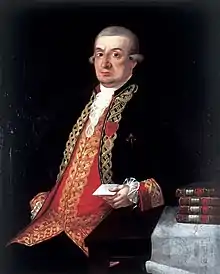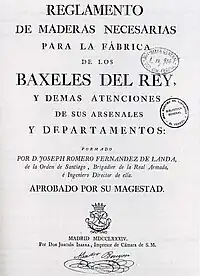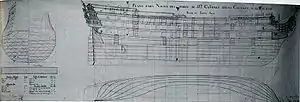José Romero y Fernández de Landa
José Romero y Fernández de Landa (1735–1807), better known as Romero Landa[1] was a Spanish naval and army officer and the Spanish Navy's first official naval engineer and ship designer. He designed several two-and three-deck ships of the line in the late 18th and early 19th centuries which fought at the Battle of Cape St Vincent and the Battle of Trafalgar.
José Romero y Fernández de Landa | |
|---|---|
 | |
| Born | 27 May 1735 Huelva |
| Died | 5 August 1807 (aged 72) Madrid |
| Other work | Naval engineer |
He is also notable as the writer of Reglamento de maderas necesarias para la fábrica de los baxeles del Rey (Rules for the wood necessary for building the King's ships), published in 1784,[1] and which specified the number and dimensions of the hulls, equipment, masts and rigging for ships of 100, 74, 64 and 34 guns.[1]
Life
On 27 May 1752 Romero Landa joined the Regimiento de Dragones de Edimburgo at Villa de Arcos, commanding a company. In 1754 he transferred to the navy, becoming an 'alférez de fragata' (ensign) and commanded the 5th Company of the 2nd Battalion of Marines at Ferrol.

On 1 November 1765 he started working at the shipyard at Guarnizo, under the ship designer Francisco Gautier. In October 1770, on the creation of the Cuerpo de Ingenieros de Marina, he was one of its few officials from the Cuerpo de Oficiales de Guerra to join the new body. Promoted to frigate captain, he was appointed Commandant of the Engineers and Engineer General, rising to Engineer General of the Fleet on 28 January 1786.
Warships designed by Romero Landa
112-gun ships

| Launch date | Name | Alias/Advocacy | Shipyard | In service |
|---|---|---|---|---|
| 28 September 1784 | Santa Ana | Santana | Ferrol[2] | 1784–1816[1] |
| 20 January 1786 | Mejicano | San Hipólito | Havana[3] | |
| 4 November 1786 | Conde de Regla | Nuestra Señora de Regla (Our Lady of Regla) | Havana[3] | |
| 2 May 1787 | Salvador del Mundo | El Salvador | Ferrol[2] | |
| 4 November 1787 | Real Carlos | Santiago | Havana[3] | |
| 20 January 1789 | San Hermenegildo | Havana[3] | ||
| 12 September 1791 | Reina María Luisa | Reina Luisa (Queen Louise) | Ferrol[2] | |
| 28 January 1794 | Príncipe de Asturias | Los Santos Reyes (The Holy Kings) | Havana[3] | 1794–1812[1] |
74-gun ships
| Launch date | Name | Alias/Advocacy | Shipyard | In service |
|---|---|---|---|---|
| 22 January 1785 | San Ildefonso | San Ildefonso, Segovia | Cartagena[4] | 1784–1805–1816[1] |
| 20 June 1788 | San Telmo | Ferrol[2] | ||
| 20 December 1788 | San Francisco de Paula | Cartagena[4] | ||
| 19 October 1789 | Europa | San Lesmes | Ferrol[2] | |
| 20 November 1790 | Intrépido | Ferrol[2] | ||
| 9 December 1791 | Conquistador | Cartagena[4] | ||
| 22 November 1792 | Infante don Pelayo | Havana[3] | ||
| 1794 | Monarca[1] | Ferrol | 1794–1805[1] | |
64-gun ships
The three 64-gun ships designed by Romero Landa were an extension of his 74-gun designs, changing its main dimensions on a scale of α=49,5/52.
| Launch date | Name | Shipyard | In service |
|---|---|---|---|
| 3 November 1787 | San Fulgencio | Cartagena[4] | |
| 27 November 1787 | San Leandro | Ferrol[2] | 1787–1812[1] |
| 27 June 1788 | San Pedro Alcántara | Havana[3] | |
Battle of Trafalgar
Five of the ships built to Romero Landa's design saw action at Trafalgar:[1]
- Santa Ana (112 guns)
- Príncipe de Asturias (112 guns)
- San Ildefonso (74 guns)
- Monarca (74 guns)
- San Leandro (64 guns)
References
- Fernández-González, Francisco (2012). "Ship structures under sail and under gunfire" (PDF). Universidad Politécnica de Madrid: Escuela Técnica Superior de Ingenieros Navales. Retrieved 4 June 2023.
- armada15001900.net (ed.). "Listado de barcos de los Reales Astilleros de Esteiro" (PDF). Retrieved 28 July 2009.
- bpvillena.ohc.cu (ed.). "La Habana antigua y moderna. Capítulo X. Arsenal". Retrieved 28 July 2009.
- digitum.um.es (ed.). "Cartagena: El Arsenal Ilustrado del Mediterraneo español" (PDF). Retrieved 28 July 2009.
Bibliography
- Juan-García Aguado, José María (1998). José Romero Fernández de Landa, un Ingeniero de Marina del Siglo XVIII. Universidade da Coruña. ISBN 84-89694-66-4
